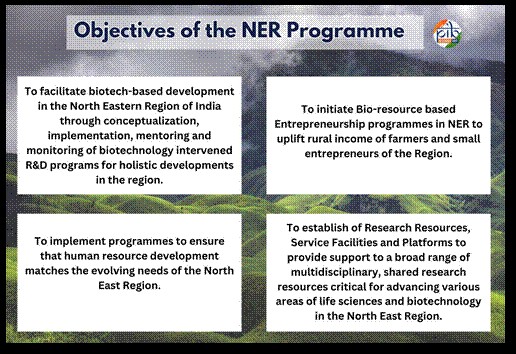Biotechnology: A Catalyst for Growth in Northeast India

Nestled in the majestic Himalayas, India’s North East Region (NER) is a treasure trove of biodiversity and cultural richness. This region is not only known for its stunning landscapes but also for its vast potential for innovation and sustainable development. The Department of Biotechnology (DBT) has recognized this potential and is leveraging biotechnology to foster growth and sustainability in the NER. By focusing on preserving natural heritage and promoting bio-based entrepreneurship, the DBT is paving the way for a green revolution in this unique part of India.
A Green Revolution with Biotech at its Core
The vision for the North East Region is ambitious. Imagine farmers cultivating medicinal plants that boost local economies and health industries. Picture young researchers developing resilient crop varieties that can withstand climate change. Envision bio-entrepreneurs transforming indigenous knowledge into globally recognized products. This vision is becoming a reality through the DBT’s North Eastern Programme, which has been operational since 2010. The programme aims to bridge the gap between the region’s immense potential and its actual prosperity.
Since its inception, the DBT has allocated 10% of its annual budget to specialized initiatives in the NER. These initiatives focus on harnessing the region’s endemic bioresources, promoting biotechnology education, and creating job opportunities through bio-based entrepreneurship. The programme has catalyzed collaborations between over 65 institutions in the NER and other leading institutes across India. Close to 650 research and development projects have been supported, benefiting around 450 researchers and 2,000 students. This collaborative effort is crucial for fostering innovation and ensuring that the local population can thrive in a rapidly changing world.
Major Programmes under NER
The DBT has launched several educational and training programmes aimed at enhancing the biotechnology landscape in the North East Region. One of the key initiatives is the Twinning R&D Programme, which began in 2010-2011. This programme focuses on developing core competencies in biotechnology by fostering collaborations between institutions in the NER and other parts of India. The initiative has successfully supported numerous research projects, enabling researchers to gain valuable experience and skills.
Another significant programme is the establishment of Biotech Hubs across the NER. Since 2011, 126 Biotech Hubs have been set up in universities, colleges, and research institutions. These hubs provide essential infrastructure and training in advanced technologies, promoting biological sciences and biotechnology education. In its second phase, 54 Biotech Hubs have been supported for focused research and training on local issues, further enhancing the region’s research capabilities.
Additionally, the Biotechnology Labs in Senior Secondary Schools (BLiSS) initiative was launched in 2014 to create awareness about biological sciences among school students. This programme aims to provide students with access to well-equipped laboratories, fostering interest in scientific research from an early age. The Visiting Research Professorship (VRP) programme, initiated in 2015, brings outstanding scientists to the region to advance biotechnology and life sciences in local institutions. These programmes collectively contribute to building a robust biotechnology ecosystem in the NER.
Supporting Local Communities and Sustainable Practices
The DBT’s initiatives are not just about research and education; they also focus on supporting local communities and promoting sustainable practices. The DBT-North East Centre for Agricultural Biotechnology (DBT-NECAB) project emphasizes services to farmers and academics. This project aims to strengthen agricultural research and development in the region, ensuring that local farmers have access to the latest scientific advancements.
In addition, the DBT has established facilities for citrus research in Assam, focusing on generating certified scion material and developing rootstocks free from diseases. This initiative is crucial for enhancing the quality of citrus crops in the region. Furthermore, the DBT has promoted the cultivation of medicinal crops, covering an area of 64.1 acres. This initiative has benefited around 649 farmers and entrepreneurs, providing them with training and resources to enhance their livelihoods.
The DBT has also installed an essential oil distillation unit in Arunachal Pradesh, helping farmers generate additional revenue. Moreover, the exploration of the Assam apple for value-added products like pickles and jams has empowered local communities. Awareness campaigns and meetings have been organized to educate tribal communities in Assam and Meghalaya about these opportunities, fostering economic growth and sustainability.
Observer Voice is the one stop site for National, International news, Sports, Editor’s Choice, Art/culture contents, Quotes and much more. We also cover historical contents. Historical contents includes World History, Indian History, and what happened today. The website also covers Entertainment across the India and World.
Follow Us on Twitter, Instagram, Facebook, & LinkedIn

